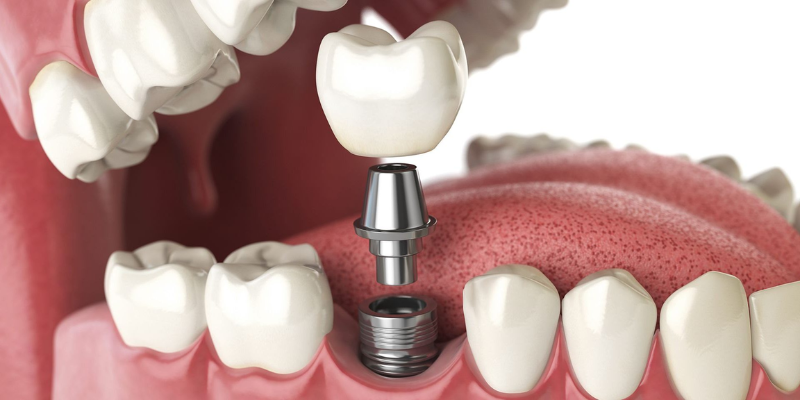Dental Insurance That Covers Implants
Is there any dental insurance that covers implants? A patient’s jawbone may not be robust enough to support an implant in some situations. In certain circumstances, a dental bone graft may be used to restore the missing bone tissue. This is not always an option, and the severity of the tissue loss will decide whether or not it is possible. To plan for implant success, we employ a CBCT 3D xray at our clinic to analyze your jawbone, teeth, and joints.
If your dentist says you’re a good candidate for dental implants, they’ll pull your damaged tooth and clean the region before implanting the titanium rods into your jawbone. Titanium is chosen because it may fuse with your bone organically. The graft and/or rod may take several months to heal. Your dentist will use a screw or dental cement to secure the abutment, which will hold the crown in place once it has healed properly.
Is There Any Dental Insurance That Covers Implants?
You may have a list of questions if you’re thinking about getting dental implants or have already determined that this is a terrific approach to improve your smile. Is implant surgery covered by your dental insurance? What is the procedure for obtaining dental insurance for implants? What dental insurance is best for implants? Because different insurance packages and providers offer different coverage, the answers to these questions are unlikely to be easy. Learn more about dental insurance and coverage in this article, as well as how specific plans may differ.
The amount of dental care you are covered for depends on the type of insurance you have. Medical insurance with dental coverage may be convenient, but it may also have drawbacks. A direct dental insurance plan, on the other hand, provides more flexibility and coverage possibilities. The following dental procedures may be covered by insurance:
- Routine office visits and expert dental cleaning are examples of preventative treatment.
- Fillings and crowns are examples of basic restorative dentistry.
- Endodontics is the field of dentistry that deals with root canals.
- Oral surgery includes tooth extractions, tissue biopsy, bacterial infection drainage, and dental implant insertion.
- Palatal expanders, braces, aligners, and retainers are all used in orthodontics.
- Scaling, root planing, gum grafting, periodontal surgery, and implant implantation are all examples of periodontics (if certified for implant placement).
- Dentures, bridges, and dental implants are all examples of prosthodontics.
What Are The Dental Insurance That Covers Implants?
These operations are divided into three classes for payment purposes, according to the National Association of Dental Implants: preventative care, basic procedures, and major procedures. Preventative care is usually covered in full by insurance policies. Basic dental procedures such as tooth extractions, fillings, root canals, and gum disease treatment may be covered at a reduced rate of about 80% or less. Major operations such as dental crowns, dentures, and dental implants are typically covered at a low percentage, such as 50%. It is normal for dental insurance policies to have a waiting period before covering costly treatments like dental implants, which is usually a year or fewer. Make sure to check with your insurance provider to see if they have a waiting time for significant dental operations like implants.
When shopping for dental insurance, you should think about the sort of plan that best fits your needs. The two most frequent types of plans are Dental Maintenance Organization (DMO) and Dental Preferred Provider Organization (DPPO). Dental HMO plans are a less expensive choice; you can choose your primary care dentist, but you’ll need a referral from that dentist to see a dental specialist. You don’t need the recommendation to see a dentist under a PPO plan, and the expenses are lower if you choose a dentist in the network. Another sort of insurance plan is a Dental Indemnity Plan, which permits you to see any licensed dentist in your state or the United States. There is no need for a referral to a dentist or a dental expert.
Other Options To Cover Implants
If you don’t have health insurance, now is a good time to look for one that meets your budget. Regular dental appointments, which are essential for excellent oral health, can be covered by dental insurance. It also aids in the cost reduction of more extensive operations such as dental implants. But what if you can’t afford health insurance? You can discuss alternate financing with your dentist; they may recommend a payment plan in which the expense is divided into installments. Your dentist may also be able to put you in touch with organizations that provide affordable payment plans (Care Credit) for dental work.
You may be self-conscious about your smile if you have missing or decaying teeth. Dental implants, fortunately, are a therapeutic option that can restore your natural smile. While the expense of the surgery may appear to be prohibitive at first, a good dental insurance plan can help cover the costs. Check to see if dental implants cover by your current medical or dental insurance. If you’ve had the plan for more than a year, you’ll relieve to learn that it does!
Dental Implants
The root of the tooth replace by metal, screw-like posts during dental implant surgery. These post insert into the jawbone and serve as a firm foundation for a crown. This is an artificial tooth. Depending on the type of implant you’re having and the quality of your jawbone, this operation can do in numerous steps.
Dental implants are replacement teeth that surgically insert into the jaw and mouth. When people lose their older, adult teeth, dentists frequently place implants. Most dental implants resemble natural teeth in appearance, feel, and function. So, they are the closest thing you can come to real, healthy teeth. Dental implants not only help to retain the appearance of your smile, but they also help to maintain the overall structure of your mouth.
A dental implant consists of a metal post that topped with a crown, which is an artificial tooth. This implant place in the jawbone to give a strong structure that helps hold the remaining teeth in place and allows for normal chewing and biting.
The root of the tooth replace by metal, screw-like posts during dental implant surgery. They’ll implant into your jawbone by your dentist. It’s where they’ll serve as a solid foundation for a fake tooth or crown. This sort of surgery is a terrific alternative to wearing dentures or having ill-fitting bridgework done because the artificial teeth look and act much like real ones.
Do Breast Implants Get Bigger After Surgery or Is There a Problem?
If you have experienced something that has made, you wonder “do breast implants get bigger after surgery?” no, breast implants do not get bigger after surgery. If a patient is experiencing enlargement of their implants, it could be due to several factors, such as capsular contracture, weight gain, or shifting of the implant. It is important to consult a plastic surgeon for an evaluation if you experience any changes in your implants after surgery. Sometimes, a revision procedure may be necessary to correct any issues.

It is also important to note that the implant size will remain the same – they will not get larger over time. During the initial consultation, patients should discuss with their surgeon the expected size of their implants after surgery, and any potential risks associated with implant sizing. It is important to ensure that patients understand the possible outcomes of their procedure before committing to surgery. Finally, it is essential to follow up with your plastic surgeon for regular check-ups after surgery, ask them, “do breast implants get bigger after surgery?” so any issues can be addressed as quickly as possible. This will help ensure that your breast implants remain healthy and safe. If you have any other questions like “how breast implant surgery is performed?” you can contact a health care provider.



